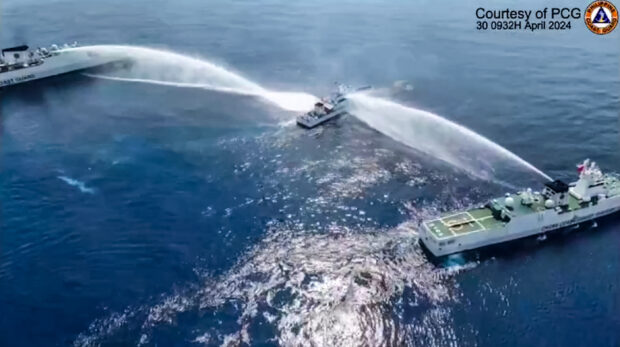
This frame grab from handout video footage taken and released on April 30, 2024 by the Philippine Coast Guard (PCG) shows the Philippine Coast Guard ship BRP Bagacay (C) being hit by water cannon from Chinese coast guard vessels near the chinese-controlled Scarborough shoal in disputed waters of the South China Sea. The Philippines said the China Coast Guard fired water cannon on April 30 at two of its vessels, causing damage to one of them, during a patrol near a reef off the Southeast Asian country. (Photo by Handout / Philippine Coast Guard (PCG) / AFP)
MANILA, Philippines — The Philippines, Australia, Japan, and the United States (US) called upon the People’s Republic of China (PRC) to abide by the “final and legally binding” 2016 South China Sea Arbitral Tribunal Award.
In a joint statement from the four countries released by the US Embassy on Saturday, it said that National Defense Secretary Gilberto Teodoro, Australian Deputy Prime Minister and Minister for Defense Richard Marles, Japanese Minister of Defense Kihara Minoru, and U.S. Secretary of Defense Lloyd Austin III met for the second time on May 2 (US time) in Hawaii.
READ: PH, US, Japan, Australia ‘cooperative activity’ set in WPS on April 7
The four leaders vowed to work together to support countries exercising their rights and freedoms in the South China Sea, the statement read.
Moreover, it said that the ministers and secretaries “expressed serious concern about the situation in the East and South China Seas” and “strongly objected to the dangerous use of coast guard and maritime militia vessels in the South China Sea.”
“They reiterated serious concern over the PRC’s repeated obstruction of Philippine vessels’ exercise of high seas freedom of navigation and the disruption of supply lines to Second Thomas Shoal, which constitute dangerous and destabilizing conduct,” it read.
READ: Japan to seize opportunities to build partnership with PH, other allies
The leaders also highlighted the importance of preserving freedom of navigation and overflight and respecting international law.
Moreover, the defense leaders emphasized their commitment to strengthen cooperation in support of regional security and stability, following the maritime cooperative activity in the Philippines’ exclusive economic zone last April 7.
They also stressed that multilateral defense cooperation among the four countries is “growing stronger than ever,” welcomed progress in coordination at all levels, and discussed opportunities for the advancement of defense cooperation.
These include “continued maritime cooperation in the South China Sea, enhanced procedures to enable coordination and information sharing arrangements, as well as strengthening capacity building.”